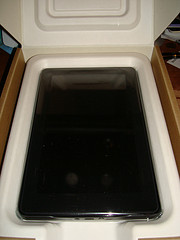
Last week, we picked up a Kindle Fire. It was a ‘gift’ for an older relative. But, in the name of ‘configuring’ it, we played with it for three days before delivering it. The Kindle Fire is a great device. We’re not sure why tech writers are coming out against it left and right.
The Kindle Fire is a solid device, solid enough it doesn’t really need a case. It has two small speakers, a headphone jack, a USB connector, and a power button. Simple and good. The headphone jack allegedly supports an external microphone, although the Appstore is not aware that it is sound capable.
The Amazon Appstore offers a good selection of apps, but not everything. We could live without the Android Market, although we paid for a lot of apps there we want to use. But we immediately side-loaded Gmail and the Google Services Framework, which can be installed without root access. If you are a Google mail user, apps or gmail, the Gmail app is superior to most third-party email apps, as it is customized.
The fact that the Amazon Video app is not available in the Appstore for non-Fire use is a mistake on Amazon’s part. Even if it is just for the streaming part, and not offline store and play. We tried downloading a few things, and see this as a great feature, if you are willing to buy.
In the end, handing it to an older relative, we preloaded it with Gmail, with dozens of Kindle books, with music, by hooking it into the Amazon account. We also loaded up some of their favorite apps from their cell phone. And while it is limited compared to their phone, the bigger screen makes it easier for them to read and do related surfing and apps. And it plays Wordfeud wonderfully…and if that is what you want…it’s great.
The one big annoyance is the carousel in the launcher. Visually it is pleasant, but anything you do ends up in this carousel and you can’t customize or remove it. Better off installing a ‘real’ Launcher.
Not everyone wants or needs a fully featured tablet. You can live without GPS, bluetooth, etc, if they aren’t things you need in daily life, and be perfectly happy.
Related articles
- Amazon Kindle Fire hacked to run the Android Market (liliputing.com)
- Remains of the Day: The Kindle Fire Will Launch with These Available Apps [For What It’s Worth] (lifehacker.com)
- What Amazon Did To Fork Android For the Kindle Fire (readwriteweb.com)




